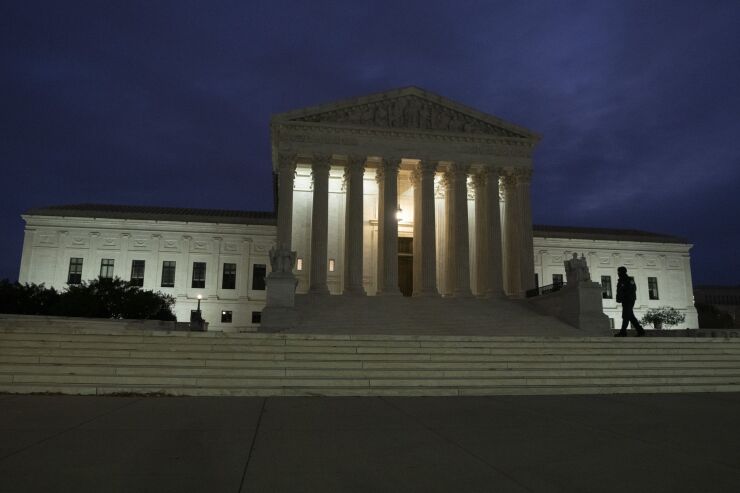WASHINGTON — A Supreme Court decision to limit the powers of the Environmental Protection Agency fell short of overturning a broader cornerstone of administrative law. But the move extended a streak of hostility toward regulatory authority that analysts expect will continue for the foreseeable future.
In a 6-3 decision released Thursday morning, the conservative majority of the Supreme Court ruled
The years-long case, West Virginia v. the EPA, was closely watched not just by environmentalists and fossil fuel advocates but by administrative law experts as well, some of whom had feared the case could have wider implications for the balance of power between regulators and their industries,
Notably, the Supreme Court’s decision against the EPA did not

But by ignoring the principle, the ruling emphasized that Chevron is not particularly popular with the conservative majority, and it may only be a matter of time before the test is formally dispensed with.
And while the Supreme Court’s ruling on Thursday was relatively narrow in scope, many policy watchers interpreted the decision as an ominous sign for any future rulemaking that attempts to push the boundaries of an agency’s authority. Industries closely policed by federal regulators may also be emboldened to push back in court on anything they view as unreasonable.
“There is little doubt that this hyper-conservative majority intends to extend this anti-regulatory ideology to the rest of the regulatory agencies,” Dennis Kelleher, president and CEO of the public interest advocate Better Markets, said in a statement. “The result will be significantly fewer protections for the American people from corporate misconduct, dirty air and water, unsafe toys and other products, dangerous predatory conduct by Wall Street banks, and so much more that will threaten the health, safety and welfare of the American people.”

Thursday’s decision featured what’s known as the “major questions” doctrine — a more ambiguous legal standard favored by the court’s conservatives that says decisions of significant economic or political consequence should not be left to federal agencies without explicit authority from Congress.
The decision argued that regulators should be blocked from “asserting highly consequential power beyond what Congress could reasonably be understood to have granted.”
Analysts say the decision is likely to have a wide impact beyond environmental law.
“At the highest level, this decision should curtail the executive branch’s capacity to implement rules, although there is some debate regarding the scale and scope of the impact,” said Isaac Boltansky, director of policy research at BTIG. “From our seat, we expect many future rulemakings to be less ambitious going forward and for nearly every politically contentious rule to face lengthy delays due to legal challenges.”
Others said that with the Supreme Court’s decision in West Virginia v. EPA, near-term legal fights over agency authority will shift toward the lower courts. Scott Pearson, a partner at Manatt, said Thursday’s decision could ultimately support the legal arguments by the financial services industry in potential lawsuits against the Biden administration, in particular the Consumer Financial Protection Bureau and
“This is a further indication that the Supreme Court is concerned about regulatory overreach,” Pearson said. “I think that this case is going to be something that the industry can rely on in resisting some of the regulatory overreach that's going on right now.”
But the impact won’t be felt overnight, Pearson said. “The only way that the regulators are going to slow down their efforts to add to their authority and do things that they're not supposed to be doing is to challenge them in court,” he said. “That starts in the trial courts, so this is going to take a long time.”
Like many GOP lawmakers, Sen. Pat Toomey of Pennsylvania, ranking member of the Senate Banking Committee, applauded the Supreme Court decision.
“I think there is a very concerted effort by some on the left to try to achieve through the unelected, and therefore unaccountable, branches of government what they can’t achieve through legislation,” Toomey said Thursday on
Toomey also implied that the decision could help industries fight efforts to bolster climate risk management in the financial system, pointing to an ongoing rulemaking at the Securities and Exchange Commission. That potential rule would increase public companies’ disclosures around climate risk and emissions. Toomey was critical of regulators injecting the issue of climate change into their oversight.
“My argument is: it shouldn’t be about how quickly you think we ought to transition our economy,” Toomey said on Bloomberg TV. “It’s about who decides and who is accountable. In a democratic society, it has to be the people who are held accountable by the American people.”
A long-term weakening of the administrative state and its regulators will shift the burden of government decision making of novel situations and crises to Congress, which has struggled for decades to legislate on anything resembling a regular basis.
“Given the structural difficulty in legislating,” Boltansky said, “the impact of this ruling could be felt for years to come.”





